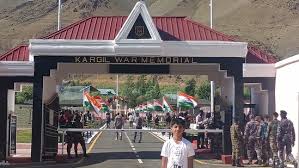
PM travel to Ladakh to honor Kargil Vijay Diwas!!!
 As part of the celebrations for the 25th Kargil Vijay Diwas, prime minister Narendra Modi said on thursday that he will be visiting the Kargil war Memorial on July 26 to honor the heroic souls who have lost their lives.The indian Army constructed the Kargil war Memorial, sometimes called the Dras war Memorial, as a monument in memory of the soldiers who fought and gave their lives during the 1999 Kargil war between india and Pakistan. The memorial is situated close to the Line of Control (LoC), which marks India's border with Pakistan, in the Kargil region of the Union Territory of Ladakh.
As part of the celebrations for the 25th Kargil Vijay Diwas, prime minister Narendra Modi said on thursday that he will be visiting the Kargil war Memorial on July 26 to honor the heroic souls who have lost their lives.The indian Army constructed the Kargil war Memorial, sometimes called the Dras war Memorial, as a monument in memory of the soldiers who fought and gave their lives during the 1999 Kargil war between india and Pakistan. The memorial is situated close to the Line of Control (LoC), which marks India's border with Pakistan, in the Kargil region of the Union Territory of Ladakh.Publish content on X According to PM Modi, today is unique for every Indian. It's a day to honor everyone who defends our country. I'm going to the Kargil war Memorial to honor our valiant warriors. In addition, he declared that the Shinkun La Tunnel Project will begin construction in order to enhance Leh's weather connectivity overall, particularly in the severe winter months. The project entails constructing a 4.1 km twin tube tunnel on the Nimu-Padum-Darcha route at an elevation of roughly 15,800 feet.
When completed, the tunnel will be the world's highest altitude tunnel. It will guarantee the swift and smooth passage of military personnel and additional defense hardware across China's border, known as the Line of Actual Control (LAC), between india and China. Additionally, the project will support Ladakh's social and economic growth. Earlier in the day, Chief of Defence Staff General Anil Chauhan said that the sacrifices made by the soldiers during the 1999 Kargil battle will "not go in vain". "It is going to continue to motivate and uplift the next generation of not only warriors but also youngsters of the country," he said. In addition, he delivered a statement from the defense ministry wishing all members of the armed forces, no matter their level, the best of luck.
According to the general, the tri-services are about to undergo significant organizational, structural, conceptual, and cultural changes. "The main goal of these reforms is to increase fighting effectiveness and maintain the armed forces' readiness for combat at all times. We need to be ready to give up on outmoded habits and embrace new ones. The top commander continued, "The form and contour of reforms must reflect the distinctiveness of the indian environment and difficulties.




 click and follow Indiaherald WhatsApp channel
click and follow Indiaherald WhatsApp channel